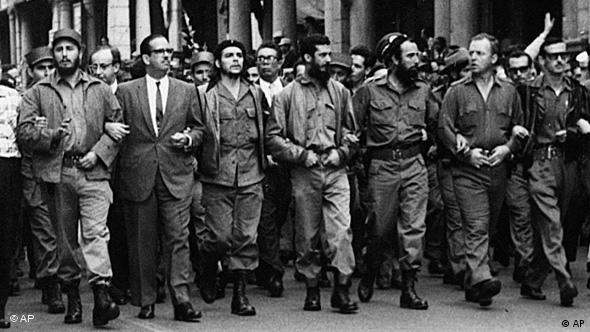What would Fidel Castro and Che Guevara have said about this historic day in Cuba? The Máximo líder and the world’s most famous revolutionary who hated homosexuals. The estimated 25,000 of them arrested between 1965 and 1968 and imprisoned in labor camps for “re-education”, “rehabilitation” and to cure the “disease”. For whom homosexuals were a vice of capitalist society who could never be, as Castro put it in 1965, “a true revolutionary, a true militant communist”.
Now, of all places, Cuba has become the 34th country in the world to legalize same-sex marriage. And while Fidel Castro and Che Guevara would be anything but enthusiastic about this, for the self-confessed homosexual, actor and activist Daniel Triana, a long-awaited dream came true with the broad approval in the referendum.
Fidel Castro (far left) and Ernesto “Che” Guevara (third from left) in Havana on March 5, 1960
He says: “Do I care what they would say? To be honest, no. They are part of an era that is definitely over. It will never come back. Cuba has turned the page of the 20th century.”
Progressive reform in a yesterday’s country
And while almost two million Cubans wanted to keep the 1975 family law, almost four million said “Sí” about the reform. In the country where it is not possible to freely elect its president, same-sex partners can now marry, adopt children and also take advantage of surrogacy.
Gender-specific violence is also sanctioned more severely, the rights of non-biological parents are strengthened and grandparents are given the opportunity to play the role of father and mother. A point that should not be underestimated in Cuba, because the well-qualified under-40s often leave the island state in droves without their children. Every day around 1,000 people are looking for a new perspective.
Actually, Daniel Triana, better known on social media as Danielito Tri Tri, should be the happiest person in Cuba these days. Triana is the face of the LGBTQ scene on the island, at least since he marched the six kilometers from Havana’s old town to his house completely alone on May 20 a year ago – with a rainbow flag around his neck. What just 14 months ago was like running the gauntlet of insults, aggression and parents dragging their children across the street as if Triana had an infectious disease.

“It is difficult to support the family law and at the same time oppose the government” – Daniel Triana
“On the one hand, I’m very happy because this is a huge step for Cuba. But on the other hand, there’s a bitter aftertaste because the government has used the family law reform campaign as a tool, pink washed it. It’s pretending progressive, but we Cubans do not live in freedom, and the memory of the repression, when homosexuals were bullied, when Fidel Castro and Che Guevara made homophobic speeches, has been completely erased.”
Government against church and exiles
Ironically, Mariela Castro, the daughter of former President Raúl and head of the Center for Sexual Education, drove the campaign – against the bitter resistance of the Catholic Church. The reform was promoted massively in the state media and on social networks, a corner was recently reserved on television for the hashtag “#Your Voice Counts” and the moderators outdid each other in hymns of praise for the historic referendum.

“The family law guarantees to a large extent the rights of all persons and families” – Mariela Castro
“And then, at the same time, scenes are still being cut out on Cuban television, kisses between men and women and other homoerotic scenes, they’re so conservative. We’re talking about television that’s 100 percent controlled by the government, by the Cuban Communist Party. You I don’t see any people, actors or celebrities openly speaking about their gay orientation,” says Triana.
Many of those who voted “no” or stayed away from the referendum did not do so because they did not agree with the reform. But because they simply didn’t buy the government’s progressive paint job and didn’t want to give it any success. “# In a dictatorship is not elected” was the hashtag of the other side, especially critics of the regime and exiles had called for a boycott of the referendum, the result of which was already certain.
Regime critics threaten “one-way tickets”
Triana of all people almost had to savor his own triumph in exile. The actor had an invitation from Documenta 15 on the table, he was supposed to come to Kassel with the “Theater Persefone” to represent the independent Cuban theater there. An accolade for Triana, but a welcome opportunity for the government to elegantly get rid of a rebellious activist with a penchant for public protests.
Daniel Triana turned down the “one-way ticket” because the risk was too great that he would be refused a return trip to Cuba and that his name would also grace the long list of forced exiles. “All my friends have warned me that if I leave the island they will not let me return. And since it is not yet my intention to emigrate, I have decided not to take the plane.”
Regime critic Triana is not done with Cuba, even though he is monitored every step of the way, his phone is tapped and he has to show up at the police station every two weeks to sign a document in which he pledges his signature to “proper behavior”. “From today we will be a better nation,” said Cuban President Miguel Diaz-Canel after the referendum. Daniel Triana doesn’t really believe in it yet.
“For this, Cuba must have political parties like everywhere else in the world. A parliament that works. Cuba needs freedom, we must create a Cuba with free thought and freedom of expression. Today’s Cuba is built on fear and nothing comes out of fear. “











